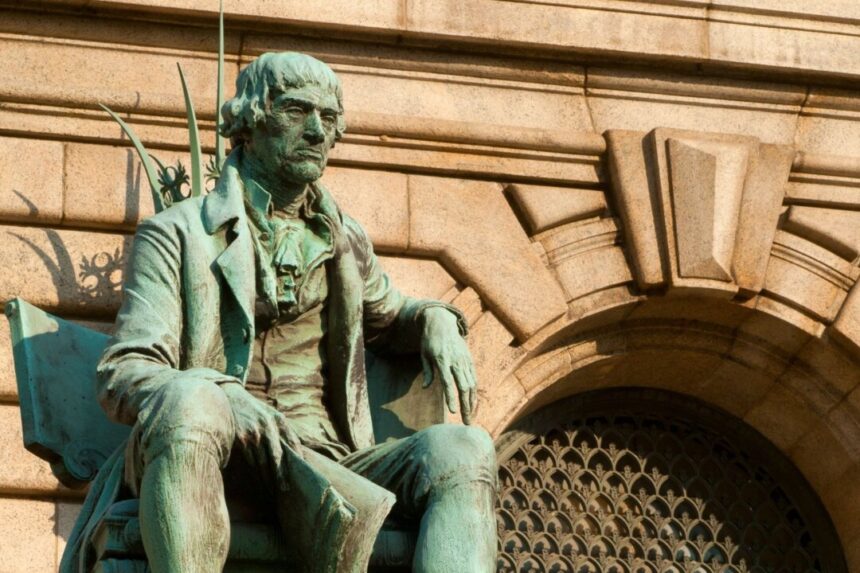Commentary
Lewis compared fresh fruit to canned fruit. The latter can be necessary for storage, but Lewis observed he had met people who learned to prefer the tinned fruit to the fresh.
Similarly, among us are those who prefer to weigh the promises of candidates as a pathway to societal advancement rather than shore up the foundations of a free society.
Friedman continued, “Every extension of the range of issues for which explicit agreement is sought strains further the delicate threads that hold society together.”
And then, as if Friedman could see ahead to 2024, he added, “Fundamental differences in basic values can seldom if ever be resolved at the ballot box; ultimately they can only be decided, though not resolved, by conflict. The religious and civil wars of history are a bloody testament to this judgment.”
Friedman clearly articulates the antidote to politics:
The widespread use of the market reduces the strain on the social fabric by rendering conformity unnecessary with respect to any activities it encompasses. The wider the range of activities covered by the market, the fewer are the issues on which explicitly political decisions are required and hence on which it is necessary to achieve agreement. In turn, the fewer the issues on which agreement is necessary, the greater is the likelihood of getting agreement while maintaining a free society.
When someone says I have unyielding loyalty to Tide detergent or Coca-Cola, their decision only affects them and their family; the rest of us go about our business.
Yet, there are many who say with great conviction: I am a lifelong, loyal Democrat or I am a lifelong, loyal Republican.
In Stalin’s Soviet Union, some falsely accused of political crimes went willingly to their death as their last service to the Party.
Such loyalties are best reserved for totalitarian societies.
This is not the loyalty that built America.
What built and sustains America is loyalty to principles.
Jefferson said, “I approach [my duty] with those anxious and awful presentiments which the greatness of the charge and the weakness of my powers so justly inspire.” An “awful presentiment” is a foreboding of disaster. Jefferson humbly recognized the limits of his personal power and did not bemoan the constitutional limits on the power of government.
Jefferson was clear that only his reliance on principles overcame his despair over the daunting responsibilities of the presidency. In the Constitution, he would “find resources of wisdom, of virtue, and of zeal on which to rely under all difficulties.”
Among the American principles, he stated, were “equal and exact justice to all men, of whatever state or persuasion, religious or political; peace, commerce, and honest friendship with all nations, entangling alliances with none; the support of the State governments in all their rights.” Then Jefferson added,
Principles form the bright constellation which has gone before us and guided our steps through an age of revolution and reformation. The wisdom of our sages and blood of our heroes have been devoted to their attainment. They should be the creed of our political faith, the text of civic instruction, the touchstone by which we try the services of those we trust; and should we wander from them in moments of error or of alarm, let us hasten to retrace our steps and to regain the road which alone leads to peace, liberty, and safety.
A claimed mandate at the ballot box must not be used to justify coercing others.
On the contrary, Jefferson urged his audience to remember the sacred principle that while the will of the majority should prevail, it must be reasonable for it to be rightful. He emphasized that the minority also have equal rights that must be protected by the law to prevent oppression.
Jefferson believed that those who cannot govern themselves should not seek to govern others, questioning whether such individuals can be trusted with the government of others.
In advocating for a “good government,” Jefferson emphasized the importance of a wise and frugal government that restrains individuals from harming each other while allowing them the freedom to pursue their own endeavors without interference.
He also promoted shared values such as honesty, truth, temperance, gratitude, and love for fellow human beings to maintain a caring society.
While some may view the government as the source of a caring society, Jefferson believed that true harmony and affection in social interactions are essential for liberty and life to have meaning.
Emerson, in his renowned essay “Self-Reliance,” cautioned against placing too much faith in political victories or favorable events, stressing that true peace can only be found within oneself through the triumph of principles.
In conclusion, Jefferson and Emerson both emphasized the importance of individual responsibility, self-reliance, and the preservation of key principles for a just and harmonious society.
Source link








